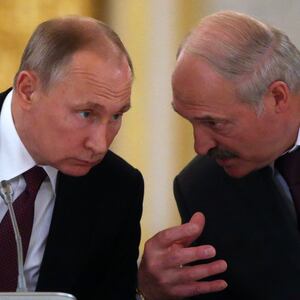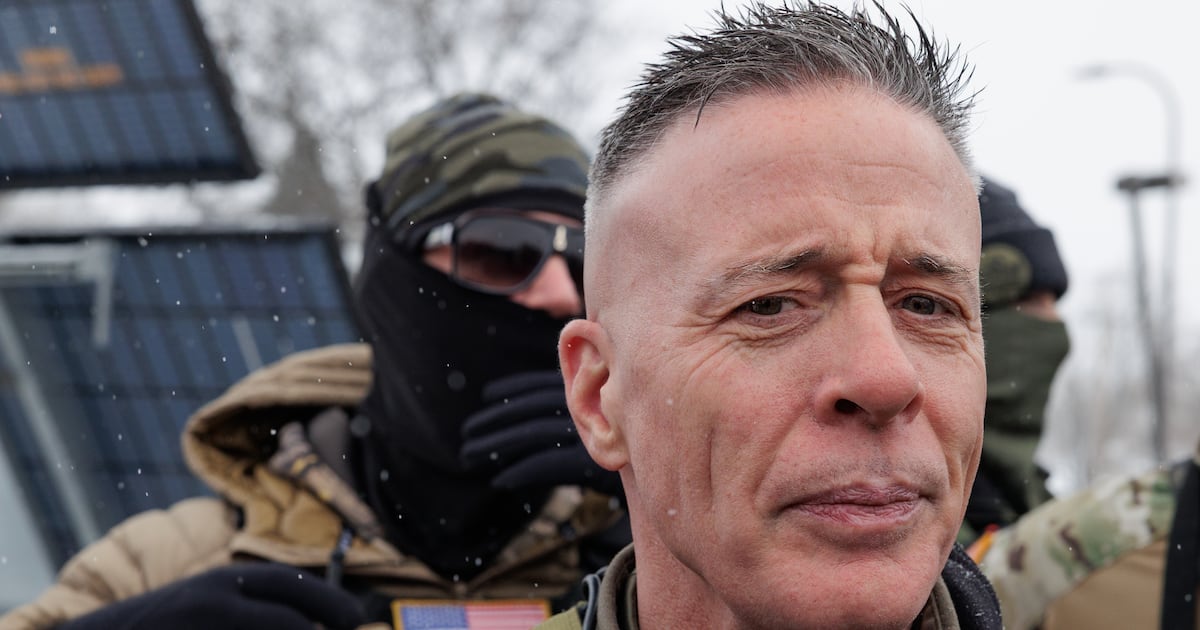Three children were among the 15 people killed in their own homes late Monday when Russia’s ’roided up war machine resulted in a military plane incinerating a residential building in the Krasnodar region.
Russian officials say those affected by the catastrophe should focus on positive thinking, and head back to work Tuesday in “a good mood.”
The questionable advice comes as ordinary Russians, perhaps for the first time since Moscow launched its full-scale war against Ukraine on Feb. 23, are finally able to see the gaping cracks starting to show in the Kremlin’s tired narrative that Russian citizens are under threat from Ukrainians. Instead, it would appear the bigger threat is their own military—and the death cult in the Kremlin.
Veniamin Kondratyev, the Krasnodar governor, arrived at the scene in Yeysk while rescuers were still digging people out of the rubble late Monday following a jet crash that left 19 injured in addition to more than a dozen dead.
He offered some spectacularly tone-deaf advice to those who lost loved ones or otherwise suffered as a result of the military disaster—just the latest in a long list of fiascos to blow back against ordinary Russian citizens during Moscow’s so-called “special military operation” against Ukraine.
The residents now need “everything necessary so that they will continue to feel… not like people, but they will nonetheless continue to work. I am certain that many of them will go to work tomorrow,” Kondratyev said in televised comments to local media.
He went on to say local authorities must do everything possible so that residents can “get ready for work and go in a good mood.”
The comments sparked an uproar even among pro-Kremlin pundits like Komsomolskaya Pravda radio host Sergei Mardan, who tore into Kondratyev for his “pearl of wisdom” on Telegram.
“It is not clear what he meant, cheerful music under the windows of a burned-out house or handing out boxes of chocolates. How can you create a ‘good mood’ among the victims of the fire, among whom 13 people died?” Mardan wrote.
Even Kremlin-friendly political analyst Sergei Markov saw signs of public disillusionment after the plane crash.
“People feel very keenly in this episode that the Russian army is much weaker than the Soviet one,” he wrote on social media, blaming the disaster on “wild capitalism” and a “weak state.”
But Kondratyev was not the only Russian official to urge citizens not to get too worked up about the tragedy.
Russian lawmaker Andrei Gurulyov also chimed in on Telegram to say that while he is “extremely sorry” for those who lost their lives or loved ones, it is important for “everyone to show restraint.”
The Kremlin offered a boilerplate response, with spokesman Dmitry Peskov saying Tuesday that President Vladimir Putin offers his “deepest condolences to the families who have lost their loved ones in this disaster.”
Russian investigators, meanwhile, say they suspect a “technical malfunction” is to blame for the Sukhoi Su-34 fighter-bomber crashing into the residential building on its way back from a “training flight.”
While Russian defense officials have stressed that the military jet was engaged in training at the time of the disaster, experts have noted that the airbase to which it belonged is conveniently close to Ukraine–just about 37 miles from Mariupol, the once bustling port city that is now under the control of the same Russian forces that virtually wiped it off the face of the earth.
The Su-34 fighter jets have also routinely been used in Russia’s bombing campaign against Ukraine, a fact which has fueled some suspicions about the true nature of the explosion that appeared to rock the residential building after the plane crash. The Russian Telegram channel “112,” citing unnamed sources, reported that the jet was loaded with ammunition at the time of the crash, a claim that was also made by local dispatchers who scrambled to respond to the disaster.
Kondratyev, the regional governor, insisted the jet was not carrying munitions, however, and Russia’s Emergency Situations Minister denied there had been any explosion in the apartment block.
The crash is just the latest military incident to strike Russian civilians as Russia’s war against Ukraine has increasingly begun to backfire on its own soil, with reports of dozens of newly drafted troops dying before they could even be sent to the frontline, and at least 11 volunteer fighters gunned down over the weekend as they took part in training for the war.
In the wake of the crash, many Ukrainians expressed sympathy for the civilians killed—but pointed out that the same Russian fighter jets had been brutally bombing Ukrainian citizens for months.
“Jets from Yeysk bombed Mariupol,” Mykola Osychenko, the president of Mariupol TV who has served as a volunteer throughout the war, said. “In light of today’s news about the Su-34 crashing into a residential building, every Mariupol resident is most upset today about the fact that the pilots ejected and survived. And sorry for the civilians. Even those who calmly watched as the jets took off in the spring to bomb Mariupol.”
Anton Herashchenko, an adviser to Ukraine’s interior minister, said the disaster should serve as a wake-up call to residents of Eysk, “since Ukrainians, under your joyful cries, have been living with this for nearly eight months now.”
The Kremlin and the Russian Defense Ministry, meanwhile, have continued to push their oft-used mantra that “everything is going according to plan.” After weeks of mounting outrage over Putin’s “partial mobilization” decree that officially called for 300,000 draftees to serve as fresh cannon fodder in the war—a move that reportedly saw men rounded up from hostels and homeless shelters, among other places—Peskov on Tuesday insisted that defense officials would not go over the 300,000-limit.
But he also noted that Putin had not yet signed a decree recognizing that the mobilization was over.








